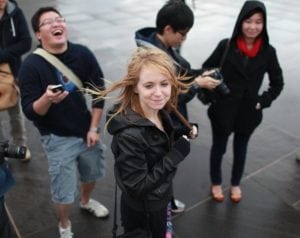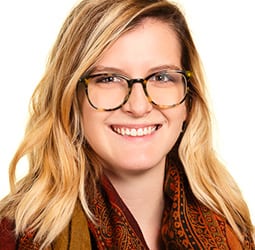Sally Hayden has traveled the globe reporting. She’s covered war-torn countries, but also has seen the perseverance of human kindness. “In Iraq we spent an evening in a games arcade; in Syria I went to a Halloween party in a Damascus bar; in Malawi I drove around in a convertible with the country’s most famous hip-hop artist,” she says. “I’m always amazed at how lovely and hospitable people are.” Learn about her experiences and amazing mentorship program in this edition of Alliance 5 Answers.
of human kindness. “In Iraq we spent an evening in a games arcade; in Syria I went to a Halloween party in a Damascus bar; in Malawi I drove around in a convertible with the country’s most famous hip-hop artist,” she says. “I’m always amazed at how lovely and hospitable people are.” Learn about her experiences and amazing mentorship program in this edition of Alliance 5 Answers.
What inspired you to become a freelance journalist?
I guess I’m fascinated by how big and interesting the world is, and how there can still be such great gaps in our understanding of how things happen, why they happen, and how we all relate to each other. I worked on the staff at VICE News for two years until they unexpectedly decided to let most of their staff go in 2016. So, for me it wasn’t a deliberate choice to freelance, but I’ve really appreciated the range of work I’ve been able to do since then.
How would you describe your day to day?
Most days I’m speaking to sources all over the world – just checking in or having longer calls with old or new contacts about issues I’m looking into, or stories they’d like me to look into. I spend a certain amount of time applying for opportunities: grants or awards or sending pitches. I usually have a few stories for which I need to write, edit audio or go through photos. I also need to do invoicing to get paid and normally I do my own travel logistics.
That’s when I’m not out reporting: when I am, I’ll spend the day meeting people, traveling around and trying to gather as much material as I can.
What is the proudest piece you’ve written, and why?
I find it hard to say I’m proud of anything, because a lot of the stories I work on are very sad and I’m sorry they have to be written. Two of the biggest stories I’ve worked on involved refugees. The first was an investigation into what happens to Syrian refugees who return to Syria from Europe. I traveled there and met a man who was arrested after going home, imprisoned, tortured and finally conscripted. That story had a huge impact: it’s been used in court cases in the US and Germany and followed up by human rights groups arguing that Syria under Assad shouldn’t be declared safe for returns. I also worked on a story about alleged corruption within UNHCR Sudan, which resulted in two internal investigations. I’d like to believe those reports will have a tangible impact for people who really need it, and I’m proud of that.
What advice do you have to those trying to break into freelance?
You have to be incredibly proactive. Even journalists with staff jobs don’t realize that a lot of the time we’re pursuing stories without commissions. I invest my own money in traveling, I take time to learn as much as possible about an issue and I spend days speaking to people without any guarantee I’ll get work out of it. Most freelancers don’t make a lot of money: I don’t even have a permanent address at the moment because I can’t afford regular rent in London. It’s also good to expand the range of what you do to earn a living so everything doesn’t have to be really intense; for example, I also do research and teaching work.
How do you describe your experience mentoring?
I mentored a refugee journalist through the UK Refugee Journalism Program, which helps exiled journalists restart their careers in the UK. Honestly, I think I probably learned more from him than he learned from me. It was difficult, because I was mentoring someone who had a family to support and also had security concerns, which meant they couldn’t publish under their own name, which is difficult if you’re trying to work in journalism. At the time, I had just lost my job, so we were exploring the industry – successes and failures – together. It really opened my eyes to how little diversity there is in British newsrooms, and how much the news industry can benefit from having a wide range of people with different backgrounds, contacts, languages, etc.

Contributing writer

